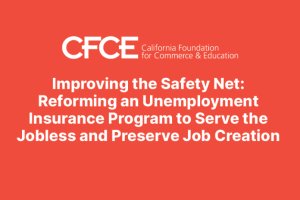 California’s vast unemployment insurance system has been under enormous strain since 2020, and employers are paying the price.
California’s vast unemployment insurance system has been under enormous strain since 2020, and employers are paying the price.
A study in consultation with two eminent practitioners of state employment policies finds that California has among the most generous and “claimant-friendly” laws regarding eligibility and claims processing, and that the state’s unemployment insurance (UI) program has among the most forgiving exceptions for misconduct or fraud in the nation.
They further note the pressure these policies place on the state’s UI trust fund, which is nearly $18 billion in debt.
Finally, the authors point to improvements in state efforts to help re-employ idle workers that will not only help them find remunerative work but reduce the strain on the insolvent UI Fund.
Michael Bernick, former director of the Employment Development Department, and Douglas J. Holmes, president of the National Foundation for Unemployment Compensation and Workers’ Compensation, consulted on the study, “Improving the Safety Net: Reforming an Unemployment Insurance Program to Serve the Jobless and Preserve Job Creation.”
The study was sponsored by the California Foundation for Commerce and Education, a think tank affiliated with CalChamber.
Worker/Employer Interest
California workers and employers have a joint interest in a responsive, efficient, and accurate unemployment insurance (UI) program that pays legitimate claims rapidly without time-consuming, multi-layered appeals to resolve disputes. California’s elected leaders, program administrators and stakeholders should drive toward this goal, but must also recognize the fundamental federal requirements that underlie the UI system regarding eligibility, fraud prevention, fund solvency, and re-employment of unemployed workers.
Since the onset of the pandemic in 2020 and the volatile employment picture for many industries, elected leaders and stakeholders have expressed urgent concern about the UI program’s speed and accessibility for claimants.
To this day, legislators and advocates propose changes in how California shapes the eligibility and management of the state’s UI program, but any improvements to the system must be informed and guided by the fundamental requirements within a federal-state program, as well as how a program financed by employer taxes can provide an adequate safety net for unemployed workers without undermining the employer’s competitiveness and business health. Improving the system must also draw on an understanding of how California’s current practices on eligibility and claims administration compare with the practices in other states.
UI System Dynamics
The study provides background and context to consider further reforms of the unemployment insurance system in California, and clarifies the federal requirements and economic dynamics of four main areas of the UI system:
• Generous eligibility and appeals processes.
California is a claimant-friendly state. Its law and practice provide among the most generous and least restrictive eligibility requirements in the nation, and it is more forgiving of fraud by claimants. The complexity of California law also creates difficulty complying with federal requirements on rapid distribution of benefits, and likely generates excessive inaccurate eligibility determinations. Policy makers must carefully consider compliance and tax consequences of further loosening eligibility for UI, and consider where eligibility, appeals and fraud rules can be rationalized and brought closer to national norms.
• Relatively low penalties for fraud.
California law has a narrow definition of fraud compared with other states, is relatively forgiving toward individuals who have committed fraud, and program enforcers have struggled to recover incorrectly distributed funds efficiently and effectively. California policy makers must recognize the struggles of the existing anti-fraud efforts when considering legislation to expand eligibility, speed benefits distribution, or ease verification requirements.
• UI fund solvency.
The unprecedented pandemic-fueled unemployment shock in 2020 created a massive debt in the state’s UI fund. The fund’s insolvency (hovering near $18 billion as of August 2023) and mandate on taxing employers to restore its health, underscore the need to ensure that benefits for workers are balanced by prudent and fair eligibility rules and fraud enforcement, as well as effective re-employment efforts. Long-term fund insolvency and related steep payroll taxes will have a dampening effect on hiring and maintaining employment.
• The UI system’s role in rapid re-employment of workers.
Discussion of the UI system is inseparable from its re-employment elements. With increased federal money related to re-employment services, California has an opportunity to improve these critical services. The study recommends expanding UI recipient identification, connection and uptake, as well as better enforce participation in these re-employment programs.


